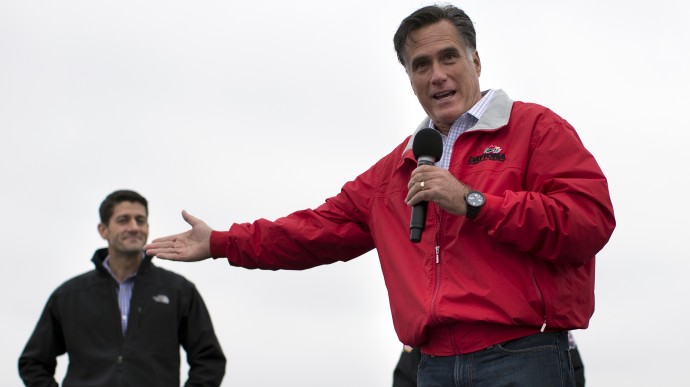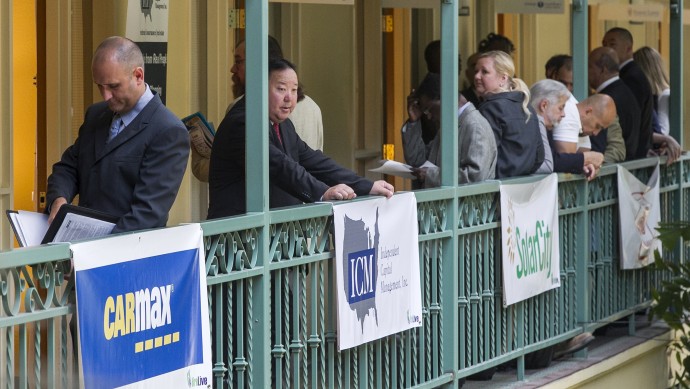
No matter who wins in November, one thing is certain. We won’t be hearing about the white working class anymore, not for another four years. This misunderstood class, millions in number, is the belle of the ball every presidential election cycle. The rest of the time, though, it’s neglected, overlooked and otherwise discredited as well as subject to a degree of cultural stereotyping that’s intolerable to other political identities.
On the left, the white working class is racist and politically ignorant, too obsessed with gays, guns and God to vote in its own economic interests. On the right, it lacks scruples, faith and a strong work ethic. It’s credulous and easily exploited for partisan purposes. And both sides tend to believe that the white working class is the heart of the tea party.
As @LOLGOP, at The National Memo, quipped, the tea party, as an organization, may not actually exist. Operationally, it is funded by billionaires. In terms of propaganda, it’s something else. “The Fox News Fan Club,” the anonymous humorist wrote. But the tea party, as an idea, has existed since the founding. It stems from Thomas Jefferson’s individualism, which generally holds that true freedom comes from self-determination, and that self-determination can never come if you don’t control your economic destiny.
Only producers — i.e., farmers and small business owners — can do that, according to this strain of Jeffersonianism. The wage-earning proletariat, on the other hand, is parasitic. The best that can be done is turn them into producers (this is not to be confused with another kind of “producerism,” which says that wealth should go into the hands of those who actually produce it, i.e., the wage-earning proletariat). Recall Jefferson’s dream of a republic populated by yeoman farmers: self-determined, engaged in a free market and free of government interference. This, of course, was before the Industrial Revolution and nationwide economies of scale. About 10 percent of Americans are now self-employed.
Moreover, those same producers typically want federal workplace regulations, designed as they are to protect the wage-earning proletariat, to apply only to corporations, not them. As Michael Lind, author of “Land of Promise,” once told me, “This unmasks the Jeffersonian project for what it is: a defense of the privileges of what Marxists might call the local ‘petty bourgeoisie’ against large-scale managerial capitalism and state capitalism.”
In other words, the tea party insurrection of 2010 was a revolt against spending and waste insofar as the upper-middle class — those producers such as doctors and lawyers making more than $250,000 a year — was angry at the government for doing less for them than for the rich, the middle class and the poor. President Barack Obama has cut small business taxes 18 times since taking office, so even that complaint holds little water. Perhaps the essence of this “revolt,” then, was the petty bourgeoisie just wasn’t bourgeois enough.
‘Oh, sweet Jesus’
U.S. Rep. Paul Ryan, Mitt Romney’s choice of running mate, has become so popular among these Fox News-loving producerists that a raucous group of them in Ohio couldn’t bring themselves to root for the top-billing Republican nominee. Instead, they shouted Ry-an! Ry-an! Ry-an! The quarter-billionaire kindly reminded them that the GOP ticket is actually “Romney-Ryan.” The depth of that moment was probably best captured by Joe Scarborough, the popular host of a morning talk-show on MSNBC and a prominent voice among Republican pundits. As he cupped his face with both hands, Scarborough said: “Oh, sweet Jesus.”
In announcing Ryan as his running mate, Romney tried to kill two birds. One was appeasing the Jeffersonian producerists of the GOP’s tea party wing to whom Ryan, thanks for his twice-passed Medicare-killing budget proposal, had become a Randian superhero (despite having voted for two debt-financed wars and the pork-barrel Medicare Part D). The other bird was, ostensibly, to make Romney more appealing the white working class.
Ryan, it was said, hailed from a blue-collar town in the American Rust Belt. He’s an Irish-American Catholic who likes to hunt deer. At one point, during a stop near Dayton, Ohio, he said that he was just like that state’s working class, because he carries a lucky buckeye in his pocket. After Romney announced Ryan as his pick, it was revealed in the press that the congressman is the heir to a family fortune made in construction, lives in the biggest mansion in Janesville, Wisc. and has never held down a job outside Washington.
As the Nation’s John Nichols said:
“[T]o suggest that Ryan is a working-class contender, or that he has ever tried to understand or support the interests of the 99 percent of Americans who don’t live in the mansions of departed industrialists (as he does), would be like describing Mitt Romney as the son of an autoworker. Indeed, [Ryan] has imbibed the frothy mix of Wall Street-dictated crony capitalism, social conservative absolutism and cold war militarism that defines elite modern conservatism.”
Down the path to totalitarianism
Given the Janus-faced nature of his “elite modern conservatism,” perhaps it’s no surprise that Ryan once warned of a “moral tipping point” facing the U.S. During a conservative event in 2011, he said that “70 percent of Americans want the American dream. … Only 30 percent want the welfare state.” In a video of that speech dug up by the Huffington Post, Ryan cautioned against the creeping tide of government dependency: “Before too long, we could become a society where the net majority of Americans are takers, not makers.”
This is a variation of radical Jeffersonianism — there are the producers and there are the parasites. But you may have heard a more recent variation. In a video unearthed by Mother Jones, Romney, just a few months after Ryan’s “makers-takers” remark, said that 47 percent of voters are “victims” who feel “entitled to health care, to food, to housing, to you-name-it … And they will vote for this president no matter what.”
The takeaway seems clear. Not only do some Americans refuse to accept personal responsibility for their lives, but that dependency on the nanny state is good for partisan politics. The more they take from the producers, the more they are likely to vote Democratic, and in turn, the more incentive the Democrats have for expanding the welfare state. And because true freedom comes only when you control your own economic destiny, the Democratic Party is, logically speaking, leading us down a path to totalitarianism.
The safety net is naturally suspect. Addressing a 2005 gathering of clubs dedicated to the philosophical writing of novelist Ayn Rand, Ryan said the goal of the Republican Party should be privatizing social-insurance programs like Social Security and Medicare, because in doing so, the GOP will reorient voters to its ideology of capitalist individualism and away from the “dependency” of the Democratic Party’s preferred “socialist based system.”
“In almost every fight we are involved in here, on Capitol Hill … it is a fight that usually comes down to one conflict: individualism vs. collectivism. … Social Security right now is a collectivist system. … [Privatization of the safety net can] put … the individual back in the game and break the back of this collectivist philosophy that really pervades, you know, 90 percent of the thinking around here.”
‘Off the mark’
This fear of the undeserving falling prey to the wiles of “collectivist, class warfare-breathing demagogues,” as Ryan put it, serves as the backdrop to one of Romney’s more potent attack ads in which he accused Obama of handing out welfare checks, no strings attached.
It was a lie, of course, but that’s not my point. My point is that this ad was reported to be aimed at white working-class voters, who, on hearing its dog whistle, were to interpret its overtones of totalitarianism — Obama is taking from the whites and giving to the blacks. As John Judis of the New Republic said, “With his recent ads on welfare, Romney is playing on the racial resentments of the white working class the same way Reagan did.”
While no one seriously doubts that such ads hope to stoke racial resentment among whites, there is reason to doubt who that audience is precisely. Greg Marx, in a corrective in the Columbia Journalism Review, wrote that the real target, according to some social science researchers, is not the white working class but college-educated whites.
“[W]hile better-educated whites generally express lower levels of racial resentment, they pay much more attention to politics. As a result, their racial attitudes become connected to a coherent political viewpoint, and they learn the racial signals embedded in political rhetoric. And so when politicians send a coded message, it is college-educated voters who are more likely to hear it. Which means that—at least according to the academic argument—journalistic accounts that describe the Romney ad as an appeal to the white working class are off the mark” [my emphasis].
“Off the mark” is a nice way of putting it. Another is that journalists are predisposed to believing that white supremacy animates the white working-class vote. In other words, the wage-earning proletariat is low-income and uneducated. Of course they’re racists!
Working-class economic populism
In part, this is a narrative decades in the making. After the Civil Rights Act of 1964, the Democratic Party’s coalition — comprising Northeastern liberals and Southern conservatives — broke apart. The white working class, hearing the call of Richard Nixon’s Silent Majority, joined the Republican Party and eventually helped manifest the Reagan Revolution.
With this has come some deep-seated assumptions about working-class whites: they are more concerned about social issues like abortion than their own economic interests; they advocate free-market capitalism, not socialism; and, recently, they constitute the heart of a mad-as-hell revolt against spending and waste. In other words, the tea party.
 I have argued elsewhere that much of this is bogus. For one thing, “working class” defies categorization. Generally speaking, however, people making more than $50,000 are not working class, though they may have earned only a high school diploma. For another, exit polls suggest that those making less than $50,000 typically vote in favor of their economic interests. They predictably vote Democratic. The lone exception is in the South, which says more about that region’s history of white supremacy, as well as the crack up of the Democratic Party after 1964, than it does about voting patterns of the white working class. In general, Southern whites — from the working poor to the rich — vote Republican.
I have argued elsewhere that much of this is bogus. For one thing, “working class” defies categorization. Generally speaking, however, people making more than $50,000 are not working class, though they may have earned only a high school diploma. For another, exit polls suggest that those making less than $50,000 typically vote in favor of their economic interests. They predictably vote Democratic. The lone exception is in the South, which says more about that region’s history of white supremacy, as well as the crack up of the Democratic Party after 1964, than it does about voting patterns of the white working class. In general, Southern whites — from the working poor to the rich — vote Republican.
What about social issues, free-market capitalism and the appeal of the tea party? Again the conventional wisdom appears to be wrong. A new survey by the Public Religion and Research Center found that working-class whites are not motivated by abortion or gay marriage more than anyone else is. They do not identify with the tea party any more than college-educated whites do. They do, however, “display a strong strain of economic populism,” according to the Public Religion and Research Center’s Daniel Cox (my italics).
Seven in 10 said they believe the U.S. economy unfairly favors the wealthy, Cox said in a press release, and a majority of respondents (53 percent) said that “one of the biggest problems in this country is that we don’t give everyone an equal chance in life.”
This isn’t a white working class that fits the stereotype. Forty-three percent favor gay marriage; only 10 percent identify with the tea party; most approve of safety net programs like unemployment insurance and food stamps. Moreover, Cox says, nearly 80 percent say that “corporations moving jobs overseas are responsible for our current economic predicament, including a majority who say corporate outsourcing is very responsible.”
Government spending isn’t to blame. An economic policy that pits this country’s high wage-earning proletariat against that country’s low wage-earning proletariat is.
Turning every worker into a capitalist
But such a clear-eyed, ground-level view makes little sense in a world divided into producers and parasites, takers and makers. And they say the creeping tide of government dependency isn’t the only thing threatening our liberties. So is the wage-earning proletariat’s dependence on the producers. In the interest of protecting liberty and fighting the threat of one-party rule, they say, it’s critical that the GOP turn every worker into a free-market capitalist. That is, a producer. Republicans can start by liberating workers from their dependency on the collectivist philosophy enshrined in Social Security and Medicare. And in turning every worker into a free-market capitalist, they say, the Grand Old Party will grow. In that speech to the Ayn Rand club (here via America magazine), Ryan said:
If every worker in this country becomes an owner of real wealth, of seeing the fruits of their labor come and materialize for their benefit, then that’s many more people in America who are not going to listen to likes of Dick Gephardt and Nancy Pelosi, Ted Kennedy, the collectivist, class warfare-breathing demagogues.
So the explicit target of the Republican Party is the safety net. Only by “reforming” Social Security and Medicare, Ryan suggests, will the party get people to snap out of their socialist stupor. Yet at the same time, the party needs the white working class vote, and this voting bloc is already hugely skeptical of the perks of free-market capitalism. That’s not just an intellectual paradox. It’s a seemingly impossible political hurdle, because the message is this: While the capitalists worry about the Democratic Party’s march toward totalitarian, by getting legions of parasitic dupes hooked on the opiate of collectivism, the white working class is worried about getting this week, next week and the week after that.
That’s not fair.
That, you might say, is worthy of revolt.


